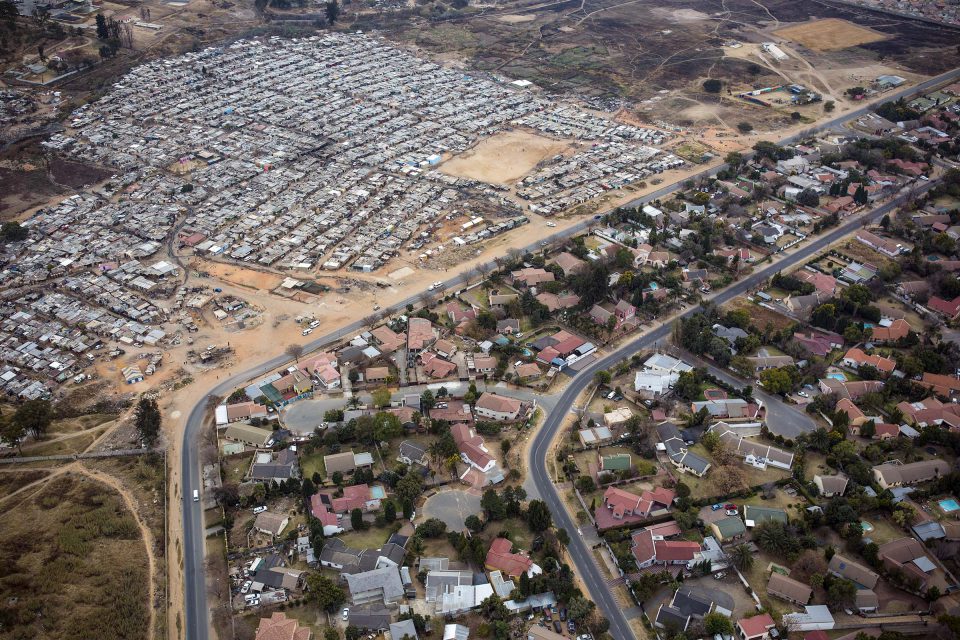Rational debate must prevail in economic questions
Ignoring empirical evidence, the elite want to impose discredited austerity measures in response to South Africa’s deepening economic crisis, a move that will further impoverish the majority.
Author:
18 October 2019

For the duration of its existence as a state, South Africa has had an economy rooted in a particularly brutal form of racial capitalism. This economy has changed in significant ways over the years, but it has never worked for the majority.
The long high apartheid boom, driven by a soaring gold price and the ruthless exploitation of black labour, meant more swimming pools in white suburbs, more profit taking in London, and more African men packed, like freight, into trains headed for the mines. More recently, boom time in Johannesburg’s affluent Sandton, the city’s financial hub, has meant systemic unemployment, or irregular access to precarious forms of work, in the neighbouring township of Alexandra.
In 1971, the poet Oswald Mtshali wrote of a man, stumbling in the early morning on to the train that would carry him to work “that squeezes me like a lemon, of all the juice of my life”. Exploitation continues but, these days, millions of people must make their lives against an absence of work. In 2012, another poet, Lesego Rampolokeng, offered a new vision of hell, people without work “living a stray existence where the township cracks, frustrated hoisted then dropped against the rocks of promise”.
Economy in crisis
During the economic growth in the years of Thabo Mbeki’s presidency, elites, often speaking as if wealth would trickle down to the majority in due course, were largely satisfied with the economic arrangements of the day. Today, it is universally accepted that the South African economy is in crisis.
There is mass racialised unemployment and impoverishment, and, after five years of the population growing more rapidly than the economy, things are getting steadily worse.
The middle classes are now also affected by the crisis. Deindustrialisation and retrenchments are escalating. The Eskom crisis has not been resolved. State failure means the middle classes are sinking into debt as they pay for private education, healthcare, transport and security. There is a significant middle-class emigration.
At the same time, serious corruption in the state and capital, along with the intense divisions in the ruling party and terrifying levels of violence, have seriously weakened confidence in the country.
Related article:
All protagonists in the public sphere now agree that the situation is not sustainable and that, as a matter of urgency, something must be done. There is broad agreement on some of the measures that have been proposed, such as the need to make it easier for skilled migrants to work in South Africa.
But trade unions, in and out of the ruling alliance, have firmly opposed Finance Minister Tito Mboweni’s economic plan. Progressive economists, often mobilising detailed empirical evidence to support their positions, have also expressed serious concerns.
The proposed plan
Mboweni’s plan is a standard version of what has, since the financial crisis of 2008, been termed “austerity” in Europe and what was previously known as “structural adjustment” in Africa, Asia and Latin America. It proposes privatisation, cutting government spending, prioritising growth over redistribution and sticking with a now discredited macroeconomic consensus that aims to keep inflation and government spending down and interest rates up.
There is abundant empirical evidence to show that these kinds of measures benefit finance capital at the expense of society. What we need are effective measures to restore the integrity of the state, fiscal expansion to stimulate the economy and increased redistribution through social programmes.
Working out a viable way forward requires careful study of what has worked – and what has not, and why – around the world. It is imperative that we break with the now almost pervasive substitution of discredited dogma for rational debate rooted in a careful examination of empirical evidence.
But the dominant view in the elite public sphere often simply asserts that Mboweni’s plan is in the national interest. Attempts to explore alternatives are dismissed as “populist”. It is often suggested that any deviation from a now discredited economic orthodoxy can only lead to the sort of crisis into which Zimbabwe collapsed during the period of hyperinflation. These kinds of rhetorical manoeuvres, which are fundamentally intellectually unserious, are attempts to prevent rather than enrich debate.
Affirming orthodoxy
This is not the first time that serious debate about economic policy has been summarily abandoned in favour of orthodoxy. In November 1991 the Macroeconomic Research Group, known as Merg, was set up with a view to exploring economic policy for South Africa after apartheid. It was launched by Nelson Mandela and included an impressive array of economists, from South Africa and around the world. It made coherent evidence based arguments for growth through redistribution.
But the leadership of the ANC, including Mandela, were rapidly moving to the right on economic questions. In part this was because of intense lobbying from British and American diplomats, as well as international and South African capital.
In 1992, Mandela famously changed his speech to be presented at Davos to make it more palatable to his audience. In 1993, the Merg proposals were dumped altogether as the ANC rushed into an uncritical embrace of economic orthodoxy, what was then termed the “Washington consensus”.
The ANC took a loan from the International Monetary Fund the following year. Tariff barriers were removed at a pace that exceeded the demands of the World Trade Organisation, resulting in the rapid collapse of some industries, including clothing and shoe manufacturing.
Related article:
In 1996, the Growth, Employment and Redistribution Programme, known as Gear, was adopted. Shortly after her time as a managing director at the World Bank, Mamphela Ramphele casually described Gear as “a structural adjustment programme”.
In three years South Africa had moved from being a site of word class evidence based debate on economic alternatives to being the only country on the planet to have voluntary imposed a structural adjustment programme on its people.
The sudden shutting down of a vibrant and rich debate about economics in the early 1990s, which concluded with the complete dismissal of the Merg proposals in 1993, put South Africa on a trajectory that entrenched mass, racialised impoverishment. It ultimately weakened Mbeki’s position and led to a turn towards a damaging form of authoritarian populism in the form of the kleptocratic and repressive project within the ANC that cohered around former president Jacob Zuma.
Debating the crisis
Today, just over a quarter of a century later, there is an urgent imperative to avoid repeating the same mistakes that were made in the early 1990s.
Trade unions have the capacity to pull the handbrake on the gathering rush towards an uncritical embrace of a set of proposals that can only compound the crisis for the majority. And progressive economists such as Basani Baloyi, Duma Gqubule, Gilad Isaacs, Michael Nassen Smith, Vishnu Padayachee and Mark Swilling, among others, offer empirically grounded and important challenges to mainstream dogma.
It is urgent that a rational and empirically rigorous discussion on our economic crisis be enabled, and that progressive economists be linked to trade unions and other popular organisations, with a view to democratising the debate about economic policy.
We cannot afford another rush, with all the recklessness of the proverbial lemmings, back to the same cliff we know all too well.


